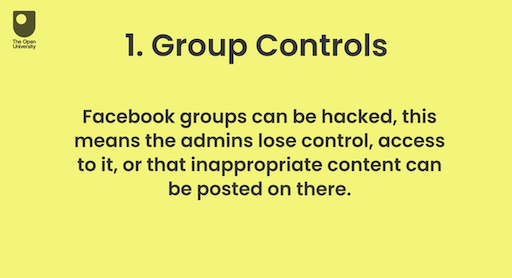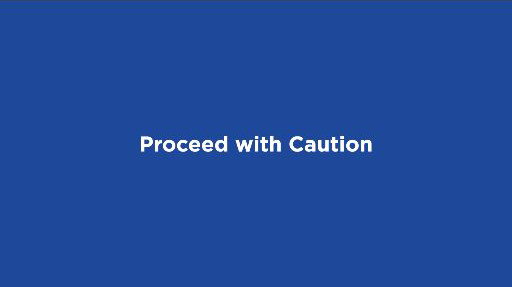1.6 Safety on Facebook
Many students use a pre-existing Facebook profile when they join groups relating to their studies. When students start to engage in Facebook communication as part of their education, particularly within groups, this will often be between groups of people rather than one to one with someone who you may know well.
This kind of activity involves new levels of risk and requires you to have a heightened awareness of the types of harm that can take place on Facebook. You may want to consider the following:

Transcript: Video 5 Points to consider (Please note this video has no spoken audio.)
[Text on screen]
1. Group controls. Facebook groups can be hacked, this means the admins lose control, access to it, or that inappropriate content can be posted on there.
2. Profile privacy. If the information on your profile is public, people in the group will be able to see things about your life. If you are not happy sharing the information, review your privacy settings. For example, if you say in your profile you are a keen wine-drinker, do you want everyone in the group to see this.
3. Friend or foe. Remember that not everyone will be who they claim to be and on a big course, or at a large university, it is unlikely you would know everyone in person. Be careful about accepting Friend requests and engaging with people on the platform.
4. Location tracking. Avoid sharing personal information (your own or others) and try not to give information away that reveals your location, unless this is specifically intended. This can mean information about where you are, for example, a specific park or restaurant, but also advertising when you are away from your home.
5. Inaccurate information. Be mindful of the fact that information on unmoderated groups or pages may not be entirely accurate. For example, if you are unsure about the word length of the essay you need to write, it is better to ask the staff teaching than others who also may not be sure but are willing to guess and share their guesses!
6. Blocking profiles. If you do experience any unpleasant behaviour online, remember that you can report it but also block the individual. We will talk more about cyberbullying and harassment later on.
Activity 3 How much do you know about how Facebook groups work?
Are the following True or False?
a.
True
b.
False
The correct answer is a.
a.
True
b.
False
The correct answer is b.
a.
True
b.
False
The correct answer is a.
a.
True
b.
False
The correct answer is b.
Answer
False: Facebook allows you to join up to 6000 Groups.
a.
True
b.
False
The correct answer is a.
Answer
True: This may include key information about you such as your name, photograph, place you live and details such as where you are studying or your job. You can choose to alter this by changing the privacy settings.
a.
True
b.
False
The correct answer is a.
a.
True
b.
False
The correct answer is a.
a.
True
b.
False
The correct answer is b.
Answer
False: You cannot always know who someone is and there are no official checks.
a.
True
b.
False
The correct answer is a.
Answer
True: This contrasts from when you are in a page when you’ll be notified when someone likes your comment or tags you in a comment.
Another thing you should be cautious about on Facebook is the perils of taking what people said as being correct without checking yourself. For example, in the following video, Cath Brown describes the dangers of following advice from students who may not be giving accurate information.

